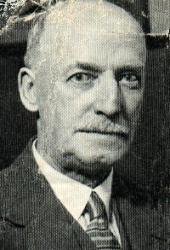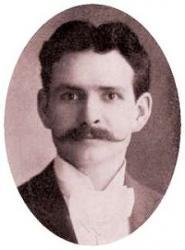1734 - 1799 Alterer of "Jesus, and Shall It Ever Be" in Trinity Hymnal (Rev. ed.) Francis, Benjamin , M.A., was born in Wales in 1734. He was baptized at the age of 15, and began to preach at 19. He studied at the Bristol Baptist College, and commenced his ministry at Sodbury. In 1757 he removed to Horsley (afterwards called Shortwood), in Gloucestershire. There he remained, through a happy and very successful ministry of 42 years, until his death in 1799. He was the author of many poetical compositions :—
(1) Conflagration, a Poem in Four Parts, (1770); (2) Elegies on the Deaths of the Revs. George Whitefield , Caleb Evans, Robert Day, and Joshua Thomas; (3) The Association, a Poem (1790); (4) a Poetical Address to the Stockbridge Indians (5) two satirical pieces on the Baptismal controversy; The Salopian Zealot; and The Oracle, the former passing through several editions and being reprinted in America.
Francis was the author of five hymns in Rippon's Selections, 1787, all of which are still in common use :—
1. Before Thy throne, eternal King . Meetings of Ministers: or Church Conferences.
2. Glory to the eternal King. Majesty of God. In Snepp's Songs of Grace & Glory for Private, Family and Public Worship, 1872.
3. In tweet [loud] exalted strains . Opening of a Place of Worship . This was given in Rippon, No. 338, in 6 st. of 6 1. with the note:—“Sung on opening the Meeting House at Horsley, Gloucestershire, [his Chapel,] September 18, 1774; and also at the opening of the New Meeting House, at Downend, near Bristol, October 4, 1786."This hymn is abbreviated in the Baptist Hymnal, 1879, to 4 stanzas, and begins with st. iii. which is altered to "Come, King of glory, come." No. 1020 in Spurgeon's Our Own Hymnbook is the same arrangement of stanzas altered by Mr. Spurgeon to "Great King of Zion, now." In several American hymnals it reads: "Great King of glory, come."
4. My gracious Redeemer, I love. The love of Christ to Men. In various collections.
5. Praise the Saviour, all ye nations . Offertory. In Snepp's Songs of Grace & Glory, 1872, No. 739, "With my substance I will honour," is a cento from this hymn.
6. Ye objects of sense and enjoyments of time . Death. A long hymn of 16 st. of 4 l. given in the new and improved edition of Rippon, 1837, No. 553, Pt. ii. with the heading, "The dying Christian bidding adieu to the world." This hymn had previously appeared in the Baptist Register, 1795.
It was as a writer of Welsh hymns, however, that Francis excelled. In 1774 he published his Alleluia, neu Hymnau perthynol i Addoliad Cyhoeddus (Hymns pertaining to Public Worship) To this he contributed 103 hymns. A second volume appeared in 1786, to which he contributed 91 hymns, being a total of 194 in all [D. Sedgwick’s Manuscript]. Of these many are still in common use in Wales, the most popular being:—
1. Clod i'r bendigedig Oen—-a oddefodd.
2. Deffro 'nghalon, deffro 'nghan—-i ddyrchafu.
3. Gwyn fyd y dyn a gred yn Nuw.
4. Arglwydd grasol, clyw fy nghri—-a'm griddfanau.
5. Wele gadarn sylfaen Sion.
[Rev. W. R. Stevenson, M.A.]
-- John Julian, Dictionary of Hymnology (1907)
See also in:
Hymn Writers of the Church
Benjamin Francis


 My Starred Hymns
My Starred Hymns




